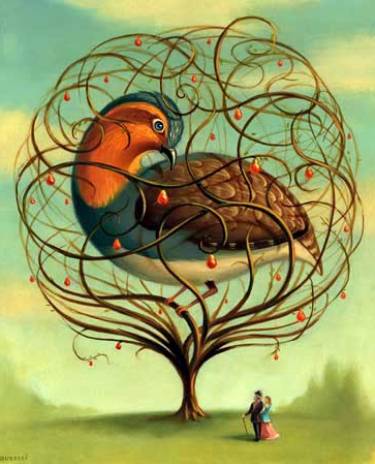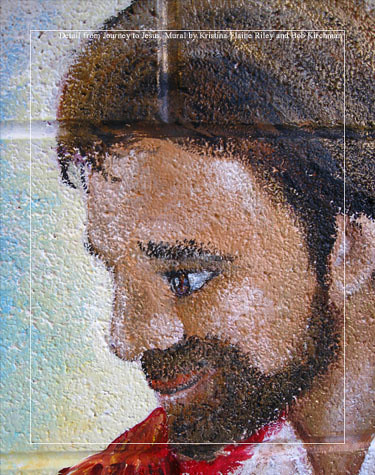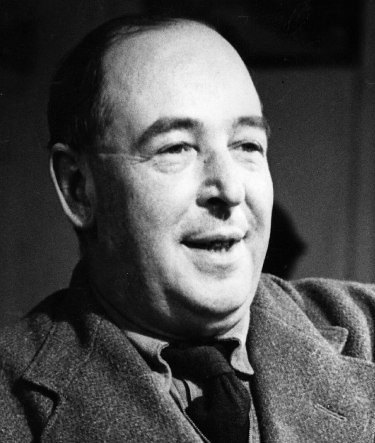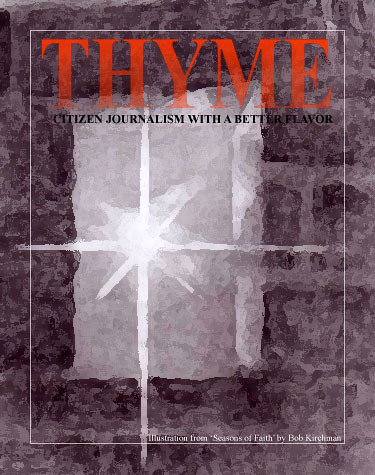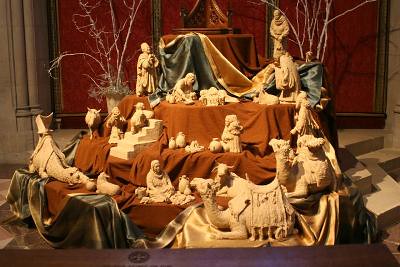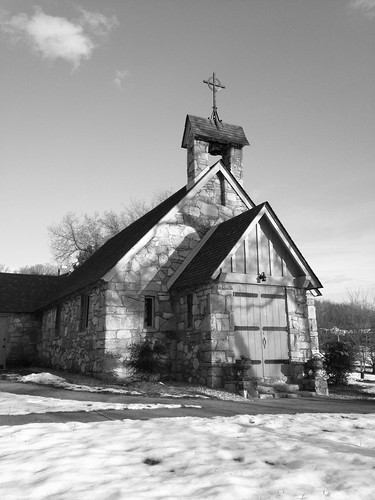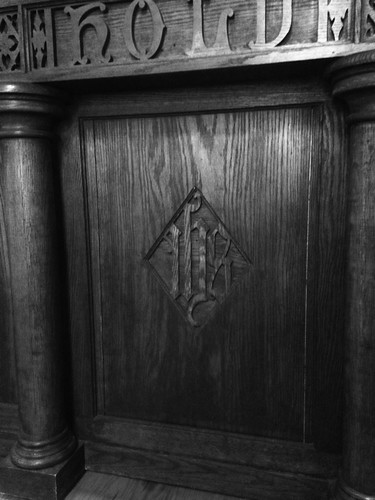Citizen Journalism with a Better Flavor
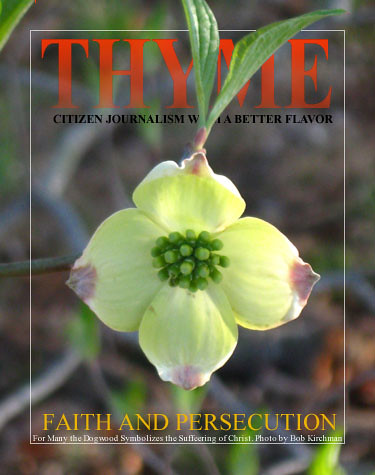 Volume VIII, Issue XXIV
Faith and Persecution
I
Volume VIII, Issue XXIV
Faith and Persecution
I will never forget the first Nepali I ever met. His name was
Prem Pradahn and I sat across from him at a Thanksgiving meal over thirty years ago. He came to Faith while serving in the British Air Force and returned to his native land eager to share the new hope he had found in Christ. Although he walked with a limp from an injury sustained in the service, Prem would walk for miles to visit villages in the mountains where he would say to anyone who would listen: "I have heard a new thing! I have heard about a man who died and came to life again!"
For this simple, but eloquent statement of Good News, Pradahn ran afoul of Nepal's strict
'anti-conversion laws.' He spent seven years in prison. Like Paul in the early church, he had a dream or a vision of the Risen Christ! This sustained him as he somehow survived an incarceration that most people did not survive. The prison he was in was notorious as a place that few came out of again. But not only did Prem did survive!, He lived to undertake new things. He gathered unwanted children into homes and taught them the wonderful story. Now he found himself revered by his community as an educator and was able to influence countless young lives. If the Apostolic age is not past, here is a man who could rightly be called one.
Though we have been blessed to live in a nation founded on principles that protected religious freedom, history tells us that Faith has from the very beginnings put the faithful at odds with the prevailing culture. The sons of Isaac living in Egypt were suppressed and enslaved, as a Pharaoh saw them as a threat. Their miraculous deliverance and elevation to a nation of promise occurred surrounded by hostile threat. Moses saw things go from bad to worse as he negotiated with the Egyptians for the freedom of his people. Though Abraham had received the promise that his descendents would be a blessing to the nations, the nations to this day
(and sadly, even so-called 'Christian' nations), do not return blessing to them. Those nations who did encourage their Jewish communities enjoyed the rich creativity they brought to the lands they inhabited. Those who surpressed them missed the blessing.
First Century Christians also were ostracized. The Roman Emperor
Claudius [Acts 18:2] ordered all the Jews out of Rome, and similarly the Christians were seen as owing their primary allegiance, not to the Emperor, but to the Divine! The persecuted church grew and affirmed the value of human life. Unwanted babies thrown into the Tiber River were rescued and raised by people of Faith in an ongoing ethic reminiscent of the story of
Moses. Moses, you will recall, was cast adrift in the Nile as the Egyptians attempted to force population control on the Hebrews by ordering the killing of their babies. Moses survived thanks to the quick thinking of his older sister Miriam and became the instrument of Divine Deliverance for his people. Faith, in its purest form, has always sought to deliver people from their present (and often wretched) state. Thus it often finds itself at odds with the civil authorities.
In most recent history, as so-called
'Christian' nations succombed to philosophies such as those of the National Socialists in Germany and the Marxists in other places; you see the rise of
"Righteous Gentiles." These people arose, motivated by Faith, to protect their neighbors from regimes intent on destroying the people G-d had called his own.
Dietrich Bonhoeffer and the Confessing Church in Germany endured similar dangers. In fact, a history of the Twentieth Century needs to include the near obliteration of the House of Israel and the rise of new philosophies of dystopia that sought to replace those ideals found in dependence on the Divine. That Century also saw a new nation of Israel reborn in the ashes of the Century's most terrible war. The Middle-East's only representative government exists there, as does a marvelous land of innovation and wonder.
Our own nation's early history is filled with stories of those fleeing persecution who established new communities of Faith on her shores. Pilgrims, Moravians, Catholics and Anabaptists all came to America seeking the freedom to live by their Faith. Virginia's own history, first as an Anglican colony and later as adopters of statutes of religious freedom, sets the stage for the First Amendment of the Constitution. Here the Federal government is prohibited from establishing a state church and is clearly prohibited from restricting the rights of
CITIZENS to actively practice their Faith! Again, one wonders at the modern overemphasis of the 'establishment' clause and the relative lack of concern about recent infringements upon
'free exercise!' In a schoolroom somewhere in America, elementary school children sing
"Praises to Obama." Their teachers instruct them to do so!
"Obama's Gonna Change the World" they sing in a rousing song taught to them by their teachers.
Michelle Malkin has assembled much evidence of such
"lessons" being taught around the country. Sadly, this is not some isolated incident. Its recurrence suggests that it was suggested as a
'lesson plan.'
In a movie clip from late 1930's Germany, nicely dressed schoolchildren sit in their orderly desks and sing:
"Adolph Hitler is our lord!" Again, their teachers have coerced them to participate in the lauding of an earthly leader in a manner that I, and many others, would believe to be reserved for the Divine! So, as the secular state writhes at the thought of students seeing a Creche or a Menorah, or G-d forbid,
THE TEN COMMANDMENTS, they blatantly usurp the place of Faith in the lives of young students. It is not always
'Praises to Obama,' but rather in subtle suggestions in lesson plans that
'your parents are not always right,' and that unbridled sexual expression is normal and desirible. Here a civil authority and morality seek to usurp the guiding principles of Faith, and their traditional repository, the family. Condoms and clinics supposedly
'free' you from such archaic constraints. To be sure, there are still many good people of Faith teaching in government schools, and their influence is to be celebrated, but one must honestly acknowledge other influences as well.
Homeschooling has emerged as a very logical response to government schools that overreach their boundaries. I have homeschooled, and I have known scores of homeschooled young people. Educators often complained that they lacked
'socialization,' but my experience is that most of these children were successfully involved in youth sports. If anything, they enjoyed a
BROADER socialization, being able to relate to
ADULTS as well as
PEERS. I have had a few homeschooled young people work alongside me in the studio. When you can confidently hand the key to your shop to someone one third of your age, and entrust that same young person with client contact, such
'socialization' arguments ring hollow. Recently a German family sought asylum in the United States because the state was going to forcibly remove their homeschooled children from their home! The Obama administration sided with the German authorities rather than the Constitutional principles espoused in the First Amendment. Thankfully public outcry stopped the administration's attempt to deport the
Romeikes, who simply sought to educate their own children in accordance with their own values.
[1.]
Constitutional Attorney
Mike Farris defended the family. His advocacy of homeschool perotection goes back for decades. He was shunned by some of his political colleagues for this during his unsuccessfu bid to become Attorney General of Virginia. I supported him. Here it must be pointed out that there has for some time existed an antagonism towards homeschooling on the part of the political establishment. That homeschooling exists largely to underscore the primary role of family in transmitting Faith makes this problematic. Test scores and other statistics would indicate that, if anything, homeschooling provides a healthy alternative to government schools. The real reason for such animosity is probably best characterized by this quote from Virginia Senator
Mark Warner, who supposed he was off-mike when he said it:
"One of the things you are going to see is a coalition that is just about completely taken over the Republican Party in this state and if they have their way it's going to take over the state government. It is made up of the Christian Coalition, but not just them. It is made up of the right-to-lifers, but not just them. It's made up of the NRA, but not just them. It is made up of the home-schoolers, but not just them. It's made up of a whole coalition of people that have all sorts of differing views that I think most of us in this room would find threatening to what it means to be an American." [2.]
So we see a continued marginalization of Faith under the guise of
'tolerance.' The fear that someone might be
'offended' by the practice of, or a symbol of Faith becomes the overriding principle for government or court intervention. No matter that little Johnny cannot understand why he cannot put Jesus on a poster for school, it might
'offend.' Also, no matter that your personal convictions are that G-d narrowly defines
'marriage.' If you refuse to bake a cake for a gay couple, or refuse to photograph their wedding, you might run afoul of
'anti-discrimination laws.' No matter that if you decline, several of your competitors are more than ready to offer their services, Faith cannot trump the imposition of a
'civil morality.' The cases of
Elane Photography,
Aaron and Melissa Klein (Sweet Cakes by Melissa),
Hobby Lobby, Conestoga Wood Specialties and
Ocean Grove Pavilion [3.] all spring from government encroachment on conscience, and as such are government reigning in religious freedom. The result is not necessarily more freedom. Consider the Catholic Charities of Massachusetts who folded their operations rather than place children with same-sex adoptive couples. Who won? Certainly not the children who lost a fine agency dedicated to helping them. Gay couples? Yes, they won a symbolic victory, but they had other government placement agencies who would already place with them. The big loser,
(aside from the children), is that part of the First Amendment guaranteeing the free exercise of religion.
The argument may be made that a pluralistic society requires a
'religion neutral' public square. May I suggest that that is simply not what is happening. By excluding values, the state simply promotes another set of values. Witness the tone of so many
'anti-bullying' initiatives that are more concerned with promoting homosexuality as
'normal' than creating a climate of mutual respect. The same school that prohibits Menorahs and Creches may be very likely to introduce Muslim practices in the guise of
'multiculturalism.' I once saw a fourth grade curriculum that celebrated Aztec human sacrifice... even going so far as to say that heart surgery was advanced by the knowledge gained by ripping out the victims' still-beating hearts! Thankfully such abuses and double standards are still more of the exception than the norm for most students. Still, is it unreasonable to look at the perpondrance of evidence and point out the civil society's instances of embracing hostility to Faith? Certainly respect for other students is to be desired and cultivated, and students benefit from learning about other cultures, but they can do so in an enviroment that celebrates, rather than derides their own.
The radicals of the 1960's have become the academics of the Twenty-first Century. Judge Robert Bork describes this quite well in
Slouching Towards Gomorrah! [4.] Classical roots of culture are regularly derided or ignored as
'modern' issue such as gender politics become the stuff of literature and learning.
[5.] What becomes quite evident is that such thinkers are all to honest in saying that Faith in the public square is a great impediment to the societal re-creation they would like to accomplish. How else do you explain the focused attacks on Faith expression,
'family values' and Classical foundations? Again, I give you Senator Mark Warner's
"off-mike" statement:
"One of the things you are going to see is a coalition that is just about completely taken over the Republican Party in this state and if they have their way it's going to take over the state government. It is made up of the Christian Coalition, but not just them. It is made up of the right-to-lifers, but not just them. It's made up of the NRA, but not just them. It is made up of the home-schoolers, but not just them. It's made up of a whole coalition of people that have all sorts of differing views that I think most of us in this room would find threatening to what it means to be an American." [6.] Add that to President Obama's remarks about Pennsylvanians
"clinging to their guns and religion" and you may see a pattern here. A literal reading of the first two amendments finds
"guns and religion" clearly enumerated as rights of citizens. The state may not establish itself over the church and the citizen, in the Second Amendment, does NOT surrender all power to the state.
So, the
"bitter clingers" might really be those who brood over the fact that our founding Fathers very nicely created checks and balances against the centralized state that they so desire. Politicians who fume about their inability to rule by executive order would do well to remember that it protects
THEM from their opponents as well. For over two-hundred years, the United States was a magnet for people fleeing the oppression of tyrants and centralized states. Many of these immigrants were religious refugees. Though far from perfect, the state that purposefully restricted itself and protected liberties became a
"Nation of Nations." You are free to believe
(or NOT to believe) as your conscience dictates. This is in great contrast to most of the world where to be of a minority religion is to be ostracized if not outright persecuted. Coptic Christians in Egypt, as well as a host of minorities caught in the re-bordering of places like the Balkans and Iraq, look longingly at the freedom we seem all too ready to cast aside. Would that we preserve it!
Beware of the Curse of 'Slacktivism'
"By this we know love, that he laid down his life for us, and we ought to lay down our lives for the brothers. But if anyone has the world's goods and sees his brother in need, yet closes his heart against him, how does God's love abide in him? Little children, let us not love in word or talk but in deed and in truth." - 1 John 3:16-18
You've signed petitions, "shared" statuses, tweeted and posted, but are you really making a difference? Wake Forest University Anthropology professor
Karin Frederic warns:
"Social media platforms like Facebook and YouTube seem like powerful tools for change. They help activists spread awareness, create networks of solidarity and mobilize people quickly and efficiently. Thousands of people can ‘like’ a campaign within 24 hours. That’s really appealing, but it’s often quite shallow and it can detract attention from efforts that could be more useful, effective and sustainable."
This is a blog, it has a
'related' Facebook page, so I write this mostly to myself, but here is an astounding fact:
'Placebo Activism' can make you feel involved and aware, but a healthy reality check would include asking yourself if you are really in the game?
"Am I sponsoring a child or a ministry in some difficult area of the world? Does my church regularly highlight the difficulties of our brothers and sisters in other parts of the world?" As Fredric reminds us:
"We need to ensure that giving is less about us and the image we can project to our friends, and more about those people in the world who really need support. Does a hungry child really care if you ‘like’ a Facebook page?" [7.]
As the world
(particularly the Middle East) becomes ever more volatile, Christians in many places are facing a new resurgence of age-old threats. Displaced Christians from places like Mosul in Iraq still need our prayers and our help, though they may have faded from the headlines. Our
FAMILY in such difficult places need us to remember them now. Groups such as
Advancing Native Missions [click to read] can channel your practical help to those who need it most. This Christmas might be a great opportunity to give our loved ones close to home, who really do have everything, the gift of helping some of these dear Saints with a gift in their name or in their honor!










